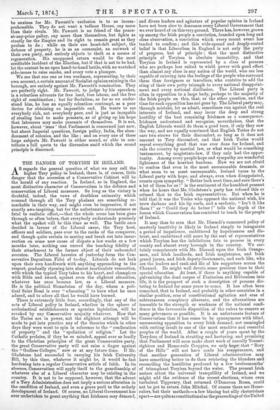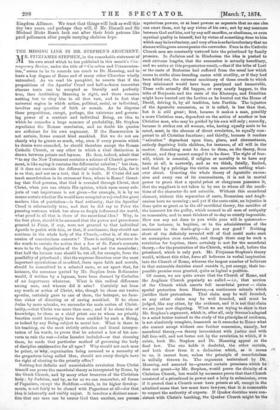THE DANGER OF TORYISM IN IRELAND.
AS regards the general question of what we may call the higher Tory policy in Ireland, there is, of course, little danger that the accession of a Conservative Cabinet will be the herald of any reaction. In Ireland, as in England, the most distinctive character of Conservatism is the defence and conservation of Liberal measures. So long as the victory is doubtful, indeed, the vows of deathless animosity which resound through all the Tory phalanx are something re- markable in their way, and might even be impressive, if not exactly awe-inspiring, but for the unfortunate circumstance so fatal to realistic effect,—that the whole scene has been gone through so often before, that everybody understands precisely what the upshot will be this time as well. The battle once decided in favour of the Liberal cause, the Tory host, officers and soldiers, pass over to the ranks of the conqueror, and though quite certain to mutiny and break out into insur- rection on some new cause of dispute a few weeks or a few months later, nothing can exceed the touching fidelity of their attachment to the former object of their unbounded aversion. The Liberal heresies of yesterday form the Con- servative Depositum Fidel of to-day. Liberals do not look upon their own handiwork with anything approaching to the respect, gradually ripening into almost inarticulate veneration, with which the typical Tory takes to his heart, and champions with Bible and sword, against even the slightest alteration, whatever has once become law, as a Liberal measure. He is the political Sicambrian of the day, whom a poli- tical Saint Remi is ever " educating " to burn what he once adored, and to adore all that he would have burned.
There is extremely little fear, accordingly, that any of the acts of Liberal policy in Ireland, whether in the sphere of ecclesiastical establishments or agrarian legislation, will be revoked by any Conservative majority whatever. Now that the Tories are in power, not the slightest attempt will be made to put into practice any of the theories which in other days they were wont to spin in reference to the "confiscation of property" and the "spoliation of religion." Let the Catholic prelates, if they be so minded, appeal ever so loudly to the Christian principles of the great Conservative party, the great Conservative party will not raise a finger against the "Godless Colleges," now or at any future time. If Mr. Gladstone had succeeded in carrying his Irish University Bill, by this time, whatever it might be, it would be fast hardening into a regular Conservative article of faith. In its absence, Conservatism will apply itself to the guardianship of whatever else of a Liberal character may be existing in the country. It is not to be supposed, however, that the advent of a Tory Administration does not imply a serious alteration in the condition of Ireland, and even a grave peril to the orderly development of Ireland. Of course no Liberal Government has ever undertaken to grant anything that Irishmen may demand, and divers leaders and agitators of popular opinion in Ireland have not been slow to denounce every Liberal Government that we ever heard of on this very ground. There has, however, grown up among the Irish people a conviction, founded upon long and close observation, a conviction which every recent event has tended to confirm ; and this wide-spread and deeply-rooted belief is that Liberalism in England is not only the party of progress, but of principle ; that the most distinctive principle of Toryism is absolute immobility, and that Toryism in Ireland is represented by a class of persons who are perhaps less suited to wield power with good effect than almost any class in any nation of the world, who are lees capable of entering into the feelings of the people who surround them than foreigners or travellers, who contrive to add the sting of their own petty triumph to every national disappoint- ment and every national disillusion. The Liberal party is often in opposition to a large body, perhaps to the majority of the Irish people on this, that, or the other question, and the time for such opposition has not gone by. The Liberal party may, through mistake, let us admit, sometimes run against the real interests of Ireland, and may incur the deep and strong hostility of the best remaining Irishmen as a consequence. Irishmen understand and recognise, nevertheless, that the English Liberals would do them a good turn, if only they saw the way, and are equally convinced that English Tories do not care two straws for their discomfort, so long as it does not amount to Tory discomfort, and that Irish Tories would repeal everything good that was ever done for Ireland, and rule the country by martial law, or what would be something tantamount, by magistrate-law, if they only had the oppor- tunity. Among every people hope and sympathy are wonderful lighteners of the heaviest burdens. Now we are not afraid to confess that even in the most unreasonable demands, or what seem to us most unreasonable, Ireland turns to the Liberal party with hope, and always, even when disappointed, counts upon sympathy. "Better luck next time, and sure there's a lot of them for us !" is the sentiment of the humblest peasant when he hears that Mr. Gladstone's party has refused this or refused that to the Irish representatives. But when he is told that it was the Tories who opposed the national wish, his brow darkens and his lip curls, and a sardonic, "Isn't it like them ?" or " Could they do better ?" tells the depth of the lesson which Conservatism has contrived to teach to the people of Ireland.
It may thus be seen that Mr. Disraeli's rumoured policy of masterly inactivity is likely in Ireland simply to inaugurate a period of impatience, embittered by hopelessness and dis- trust, and embittered still more by the sort of representatives which Toryism has the infelicitous fate to possess in every county and almost every borough in the country. We cer- tainly commiserate with Mr. Disraeli upon the Irish Orange- men, and Irish landlords, and Irish magistrates, and Irish grand jurors, and Irish deputy-lieutenants, and such like, who are the leaders and rank and file of his supporters across the Channel. He might well devote some precious time to their special education. At least, if there is anything capable of galvanising the dead corpse of Fenianism and Ribbonism into life, it is the prospect of such a description of persons dic- tating to Ireland for some years to come. It has often been remarked, that in Ireland, and probably in other countries in a similar position, eras of constitutional agitation and eras of subterranean conspiracy alternate, and the alternations are traceable to the strength or weakness of the national confi- dence in the favourable disposition of the rulers to remove as many grievances as possible. It is an unfortunate feature of Conservatism that it has come to be synonymous with blind, unreasoning opposition to every Irish demand, not unmingled with cutting insult to one of the most sensitive and resentful peoples of the world. After a couple of years spent by the Torydom of Ireland in strutting and hectoring, and promising that Parliament will Boon make short work of rascally Tenant- righters and Home-rule Croppies, we only hope that "Rory of the Hills" will not have made his reappearance, and that another generation of Liberal administration may have something better to do than retrieving the blunders and reconciling the hostilities produced by a few twelvemonths' of triumphant Toryism bqond the water. The present Irish assizes attest the universal tranquillity of Ireland, and we might add the evidence of the recent elections, where even turbulent Tipperary, that returned O'Donovan Rossa, could not be got to return John Mitchel. Of course there are Home- rulers, but their methods—a few blazing but silly rhetoricians apart—are quite as constitutional as the proceedings of the United
Kingdom Alliance. We trust that things will look as well this day two years, and perhaps they will, if Mr. Disraeli and Sir Michael Hicks Beach look out after their Irish patrons like good policemen after people carrying skeleton keys.



































 Previous page
Previous page